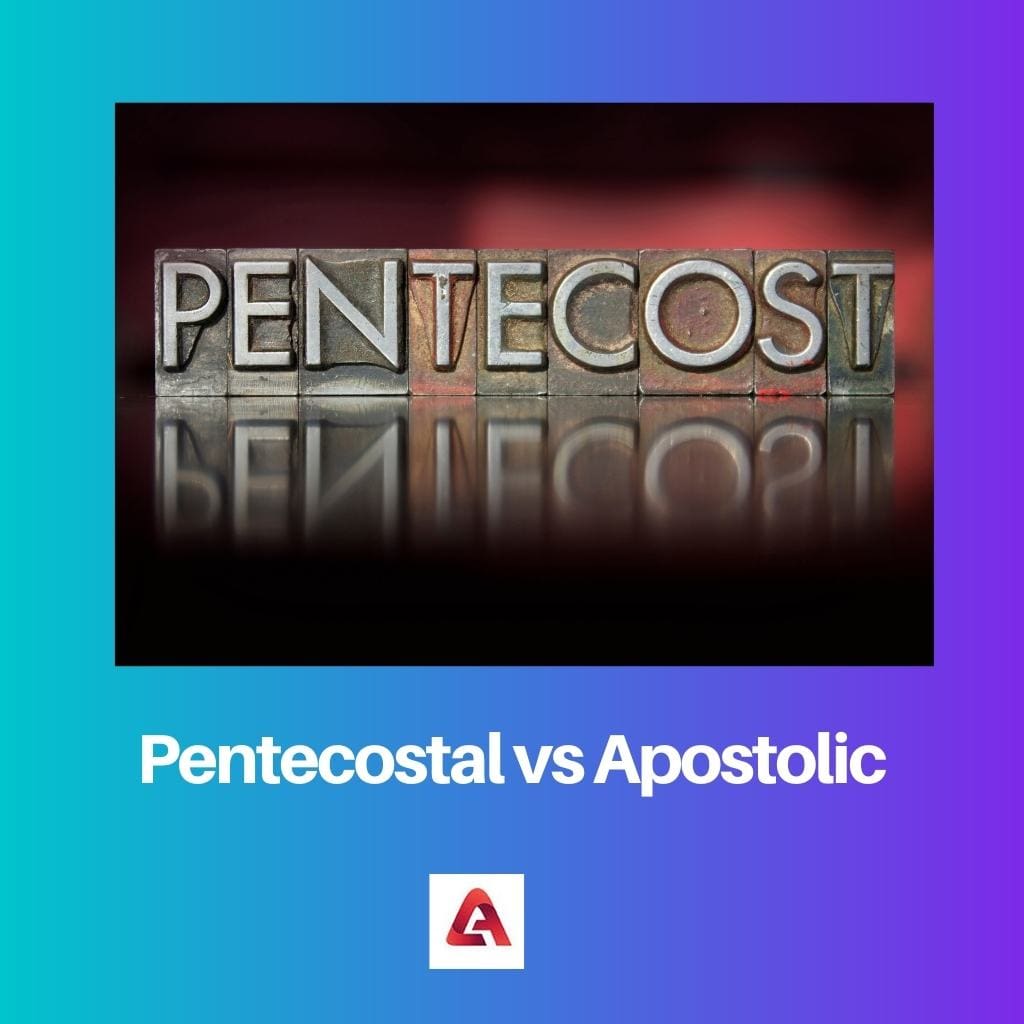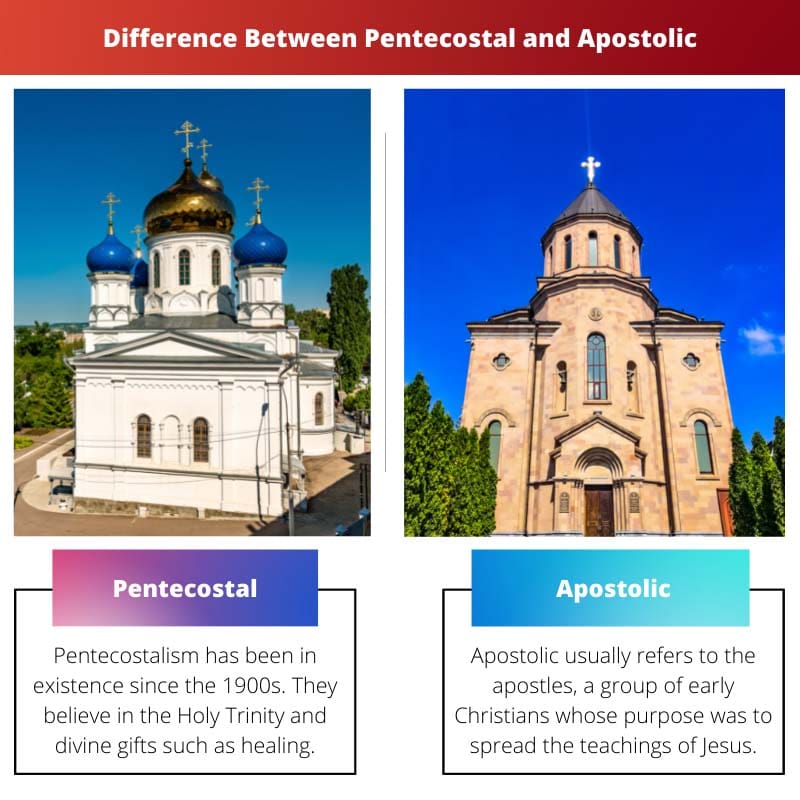Faith is a small word that encompasses a huge part of one’s life. It helps one sail through difficult times when everything else seems grim.
There are various faiths that people believe in, in this world. The belief in the power of faith is a common characteristic of the Apostolic and Pentecostal cultures.
Key Takeaways
- Pentecostals believe in speaking in tongues as the initial evidence of receiving the Holy Spirit, while Apostolics believe in the Oneness of God.
- Pentecostals encourage evangelism and missionary work, while Apostolics believe in the necessity of baptism by immersion in water.
- Pentecostals have more contemporary worship styles, while Apostolics prefer traditional forms of worship.
Pentecostal vs Apostolic
In Christianity, Pentecostal is a member of the Church that believes in the Holy Trinity: Father, Son and the Holy Spirit. They believe in the text of the Bible to be flawless. Apostles refers to early Christians who spread the wisdom and teachings of Jesus Christ. They believe God to be present in a single form.

Pentecostal churches are the ones that carry out the work and legacy of belief in the Holy Spirit and the complete and exact truth of the Bible. A Pentecostal is a person who is a member of a Pentecostal Church. These people include the Protestant Christians who believe in the Holy Spirit’s live manifestation.
Apostolic refers to a person that is a member of the Apostolic Church and is related to the role of the Apostles. Apostles were a group of devout Christians that spread the word about Jesus Christ and his teachings. They believe the Bible is God’s Word and encompasses the truth.
Comparison Table
| Parameters of Comparison | Pentecostal | Apostolic |
|---|---|---|
| Baptism | The belief is of Baptism by the Holy Spirit. | They believe that baptism is through immersion. |
| The belief of God | They believe in the Holy Trinity. | They believe in God to be only one. |
| Salvation | They believe in salvation when you accept Jesus to be your saviour. | They believe that salvation comes through the atonement of one’s sins and baptism. |
| Rules | The Pentecostal has a dress code that encourages modesty but isn’t very rigid. | The Apostolic have a strict dress code. |
| Meaning | It means the power from above and its evidence is seen in the various tongues a person speaks in. | It means the one sent by God. |
What is Pentecostal?
Pentecostalism has been in existence since the 1900s. They believe in the Holy Trinity and divine gifts such as healing. Their belief in speaking in different tongues is their unique identity.
Pentecostalism was a protestant Christian movement from the word “Pentecost.”
Pentecost was when the Holy Spirit was supposed to descend upon the earth and talk to the followers of Jesus Christ in foreign languages. Hence, the belief in different tongues.
They believe in “Baptism by the Holy Spirit.” They also perform Water Baptism and Baptism into the body of Christ. Pentecostals also believe in the Bible and consider it valid and without error.
They interpret the Bible very literally. Prayer and faith are accepted to be the most critical aspects of the healing process, and it is also agreed upon that Jesus is a healer.
Five values govern the spirituality of a Pentecostalism believer. They are the individual experience, orality, spontaneity, asceticism, and a commitment to biblical authority.
One of the most time-forward features of these churches is that they also ordain women to serve as missionaries, pastors, or preachers.
Although some rules are strict, their worship is more free-flowing and spontaneous.
| # | Preview | Product | |
|---|---|---|---|
| 1 |

| Foundations of Pentecostal Theology | Check Price on Amazon |
| 2 |

| Bible Doctrines: A Pentecostal Perspective | Check Price on Amazon |

What is Apostolic?
Apostolic refers to the apostles, a group of early Christians whose purpose was to spread the teachings of Jesus.
There are a lot of variants of the Apostolic churches, many of which also follow the Pentecostal doctrine, while some do not.
Apostolic churches are led by their prime-most member, the chief apostle.
They are people who believe in Baptism by Immersion. Apostolic followers differ in their opinion of God.
They do not believe in the Holy Trinity, the Father, the Son, and the Holy Spirit. Apostolic followers believe in God to be of only one form. They believe each to be another form of Jesus.
To achieve salvation, in Apostolic culture, one must repent for his or her sins and be baptized by immersion.
The Apostolic Church’s theological beliefs have been noted in its confession of faiths, better known as the Tenets. However, certain beliefs are shared.
One of them is the belief that their scriptures, such as the Bible, are the inerrant word of God. Their sacraments are Baptism by immersion and the Last supper.
They also believe in the return of Jesus and in interpreting the Bible for its literal meaning.
| # | Preview | Product | |
|---|---|---|---|
| 1 |

| Moving in the Apostolic: How to Bring the Kingdom of Heaven to Earth | Check Price on Amazon |
| 2 |

| The Apostolic Handbook: Your Personal Voyage to Apostolic Office | Check Price on Amazon |

Main Differences Between Pentecostal and Apostolic
- The main difference between the Pentecostal and Apostolic views is that Pentecostals believe in God having three faces; the Father, the Son, and the Holy Spirit, better known as the Holy Trinity. Apostolic views are such that they believe these to be the manifestations of one God.
- The route to salvation is accepting Jesus Christ as their saviour in Pentecostalism. In Apostolicism, salvation is through the atonement of their sins and baptism by immersion.
- Apostolicism is to believe in baptism that is performed “in the name of Jesus.” Pentecostalism believes in baptism performed “in the name of the Father, the Son, and the Holy Ghost.”
- Apostolicism has very rigid rules about modesty in the dress code, while Pentecostalism does have a dress code that is not as rigid.
- Pentecostal means the power from above that, once bestowed upon a believer, shows evidence through speaking in unknown tongues, while Apostolic means the ones sent by God. It refers to the apostles, that were the early Christians, spreading the teachings of Jesus.




